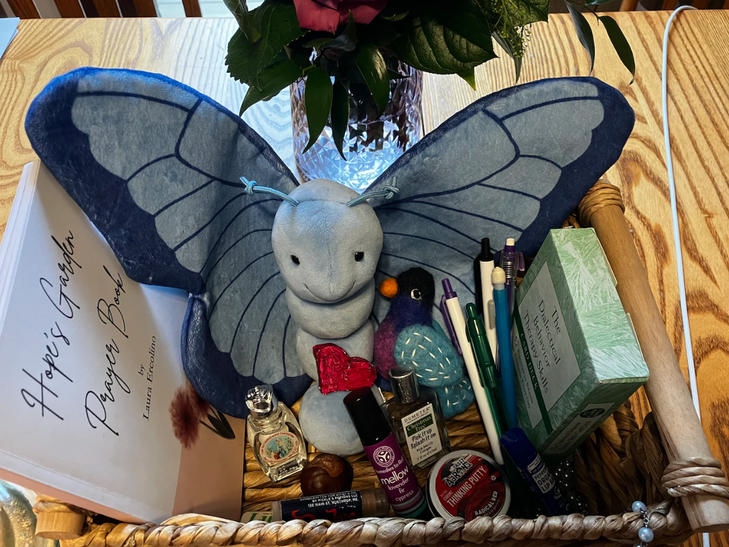|
Creating a safety plan is one of the crucial “what if” steps of preparation for individuals who are enduring abuse in their home. Crafting ways to carefully escape, to seek security with loved ones or in a domestic abuse shelter, to have all your necessary valuables (including your birth certificate, Social Security card, passport, etc.) in a safe place, are all important issues to consider when creating a physical safety plan.
But what about an emotional safety plan? During those times when you’re not in physical danger and don’t want to—or can’t—leave the home, how can you protect yourself emotionally and spiritually? Creating an emotional safety plan is just as important as a physical safety plan because it’ll help remind you that there is hope and that you do have resources. An emotional safety plan is crucial for self-care and even for developing healthy empowerment and a sense of autonomy. Healing from the wounds of prolonged trauma is a journey—it takes time, patience, and self-love. It’s often that last piece—self-love and self-care—that trip us up the most. There are many things we can do to take care of ourselves and help nurture a developing sense of wellbeing while healing from trauma. For example, creating a self-soothing basket filled with items that bring peace, joy, and calm can be an excellent resource for emotional health. Items to include in the basket can included things such as:
0 Comments
Don’t Plant Your Seeds Among Thorns: A Catholic Guide on Domestic Abuse: Chapter One: An Overview of Domestic Abuse When the topic domestic violence is mentioned, people often visualize black eyes, broken bones and clenched fists. However, manipulation and control over another individual takes many forms. Domestic abuse can violate a person not only physically but emotionally, spiritually, psychologically, sexually and financially. Bruises, broken bones and smashed faces shout obvious violence, traumatic for the victim and outwardly visible. A broken spirit isn’t as visible, and bruises to the soul are easily buried with a false smile and cover-up stories to hide the truth. Yet in a multitude of studies and interviews, survivors have consistently affirmed that emotional, psychological and verbal abuse are even more traumatic than broken bones. All forms of abuse leave scars and bruises in the soul. These destructive actions aren’t isolated events. Everyone makes mistakes, saying and doing things they later come to regret. They soon recognize their slip-ups, make genuine reparation, and don’t repeat the toxic behavior. An abusive relationship, on other hand, is a pattern of attitudes and actions that create a confusing, terrifying, fragile and crazy-making atmosphere within what should be the sacred space of the home. The abuse is repeated, again and again. Even if months go by with no obvious incident, eventually the same pattern reappears—and, as the years go by, the pattern reappears with increasing frequency. Some examples of domestic abuse include:
The idea of "radical acceptance" doesn't sound like a pleasant thing, doesn’t it? In many cases, it doesn’t even seem possible. Are we truly supposed to accept unacceptable situations, such as abuse and injustice?
Strangely enough, the answer is yes—all while keeping in mind that acceptance doesn’t mean toleration of something that should never be tolerated. So what is radical acceptance, and how does it help us move through the stages of grief as we navigate healing from a toxic relationship? Don't Plant Your Seeds Among Thorns: A Catholic's Guide on Domestic Abuse by Jenny duBay Introduction The Catholic Church understands the true nature of marriage. The marital union isn’t merely a piece of paper and a few words spoken between two people, followed by a fun party. It’s not a gold band, or a promise to remain faithful—until disagreements pop up or someone more exciting comes along. For Catholics, marriage is a sacred sacrament, an indissoluble union that, according to The Catechism of the Catholic Church, is “a partnership of the whole of life … ordered toward the good of the spouses and the procreation and education of offspring” (CCC 1601). Love is “the fundamental and innate vocation of every human being” (CCC 1604). Yet what happens when the indissoluble becomes desecrated, when the sacrament promised at the altar in the presence of God proves to have been a lie? What happens when the early excitement of a loving relationship and future family are replaced with anxiety, confusion, turmoil and even cringing fear? Sacred Scripture describes well how such betrayal feels: "My heart is in anguish within me, fear and trembling come upon me, and horror overwhelms me. It is not an enemy who taunts me—then I could bear it; it is not an adversary who deals insolently with me—then I could hide from him. But it is you, my equal, my companion, my familiar friend. We used to hold sweet converse together; within God’s house we walked in fellowship." (Ps. 55:4,5,12-14) Every day, around the world, millions of individuals are crushed by the trauma of living with a spouse who controls, mistreats or otherwise violates their sacred personhood. The statistics are shocking: one out of every three women has been or currently is a victim of abuse within their own homes.1 Yet even if you’re among those statistics, you might be unaware of the truth of your situation. Instead, you may be full of self-blame and doubt—especially during the times when your spouse is acting kind, charming, even remorseful. It’s common for victims to minimize their experience, to believe their partner when he says they merely have “regular” relationship or communication problems. Victims often tell themselves, “It’s really not that bad. Sure, sometimes he calls me stupid or an idiot, but at least he’s never called me anything worse.” Or, if he does make it a habit to hurl even the most brutal insults, a target may try to minimize the situation by thinking, “Well, at least he’s never hit me.” If he is physically violent, “at least he’s never broken a bone.” If he has broken a bone, “At least I’ve never been knocked unconscious.” And on … and on. This minimization isn’t a deliberate effort to excuse the behavior of the abuser, but rather an unconscious defense mechanism that attempts to make sense of the nonsensical. To be the partner of an abusive spouse is to live in constant anxiety. Developing coping strategies is a necessary part of living in a toxic environment. Yet living in that environment doesn’t have to be permanent. Healing begins with awareness, education, support and guidance from the Holy Spirit. These are all things this book will help you develop. To continue reading the introduction to my book, along with future chapters as they're released please subscribe to my Substack newsletter. A paid subscription is necessary in order to read the book.
After a multitude of requests for updates on the book project I’ve been working on, as well as recent suggestions from my clients, I’ve decided to offer Don’t Plant Your Seeds Among Thorns: A Catholic’s Guide on Domestic Abuse to all paid subscribers of my Substack blog. Topics covered in my book include:
And so much more!
|
AuthorJenny duBay, Trauma-Informed Christian life coach specializing in healing from betrayal trauma and domestic abuse. |






